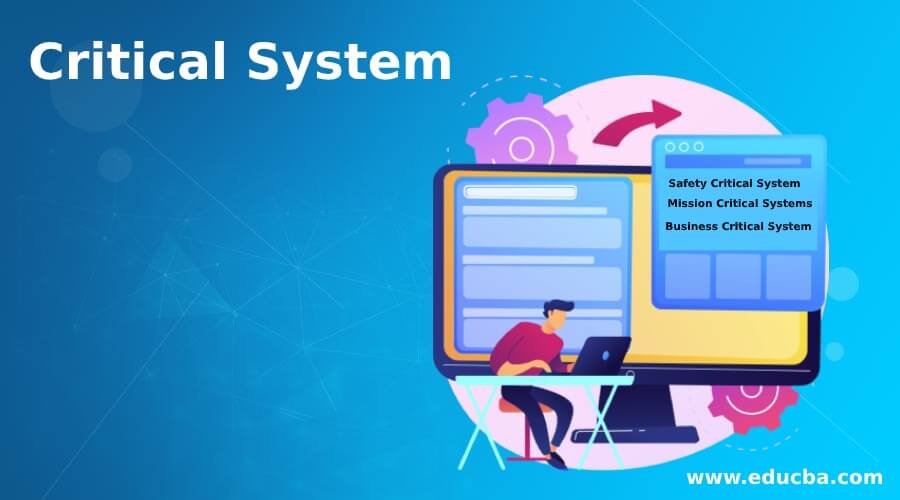Updated April 12, 2023
Introduction to Critical System
A critical system is a system that refers to the systems that are efficient and retain this efficiency as they change without prohibitive costs being incurred. In today’s highly competitive global market, a critical system is considered the one on which business or organization is almost dependent for its very survival and prosperity. Critical systems are highly dependent on good quality, reliable, cost effective software for their integration. successful construction, operation, and maintenance of critical systems is dependent on well defined and managed software development and highly capable professionals.
Types of Critical System
There are three types of critical systems
- Safety Critical System: Any failure in these systems results in injury, death or damage to the environment. For example, chemical plant system.
- Mission Critical Systems: Any failure in these systems result in the failure of some expected goals. For example, Spacecraft navigation system.
- Business Critical System: Any failure in these systems result in high financial loss. For example, the Bank accounting system.
System Dependability
The system dependability is the trustworthiness on the system that means the user’s degree of trust in that system. it shows the extent of the user’s confidence on the system that it will operate as he expected and that it will not fail in normal use. Usefulness and trustworthiness are different. A system need not have to be trusted to be useful. The common dimensions of dependability are availability, reliability, security and safety. Availability is the ability of the system to deliver the services whenever required. It is the probability that a system, at any given point of time is operational and able to deliver the needed services. Reliability is the ability of the system to deliver the services as specified and expected by the user without any failure in normal use. Security is the ability of the e to protect itself against accidental intrusion or malicious attacks. Safety is the ability of a system to operate without catastrophic failure.
Importance of Dependability
- systems those are not dependable that means systems that are not trustworthy, unreliable, unsafe or insecure are rejected by their users.
- Undependable systems may cause loss of valuable information resulting in a high recovery cost.
Influences on Reliability
- Hardware Reliability: What is the failure probability of a hardware component and how long does it take to repair that component
- Software Reliability: How frequently a software component produces an incorrect output?
- Operator reliability: How likely the operator of a system makes an error?
- Repairability: It is the extent to which the system can be repaired in the event of failure.
- Maintainability: It is the extent to which a system can be adapted to new requirements.
- Survivability: It is the extent to which a system can deliver services under the condition of an accidental attack.
- Error Tolerance: It is the extent to which user input errors can be avoided and tolerated.
Simple safety critical system Terminology used in safety are as follows - Accident: It is an unexpected event that results in human death or injury, damage to property or to the environment. For example, A computer controlled machine injuring its operator.
- Hazard: It is a condition that causes or contributes to an accident. For example, a failure of the sensor that detect an obstacle in front of the machine.
- Damage: It is a measure of loss resulting from an accident. For example, many people killed as a result of an accident to minor injury or property damage.
- Hazard Severity: It is an assessment of the worst possible damage that could result from a particular hazard. For example, many people are killed just only due to minor damage.
- Hazard Probability: It is the probability of the event occurring which create a hazard. Probability values ranges from probable to unbelievable.
- Risk: It is a probability that a system will cause an accident. The risk is assessed by considering the hazard probability and hazard severity.
Safety Achievements
Safety in a system can be achievement by using various ways:
- Hazard Avoidance: The system is designed so that some classes of hazards cannot arise.
- Hazard Detection and Removal: The system is designed so that hazards are identified and deleted before the system meets any accidental failure or damage.
- Damage Control: The system contain protection features that minimize the damage that may occur due to hazard.
There are two types of safety critical systems
- Primary safety critical system: These are embedded software systems whose failure causes the associated hardware to fail and directly threaten then users.
- Secondary safety critical systems: These are the system whose failure results in faults in other systems which can threaten the users of the system.
Recommended Articles
This is a guide to Critical System. Here we also discuss the introduction and types of critical systems along with system dependability and its Importance. You may also have a look at the following articles to learn more –



